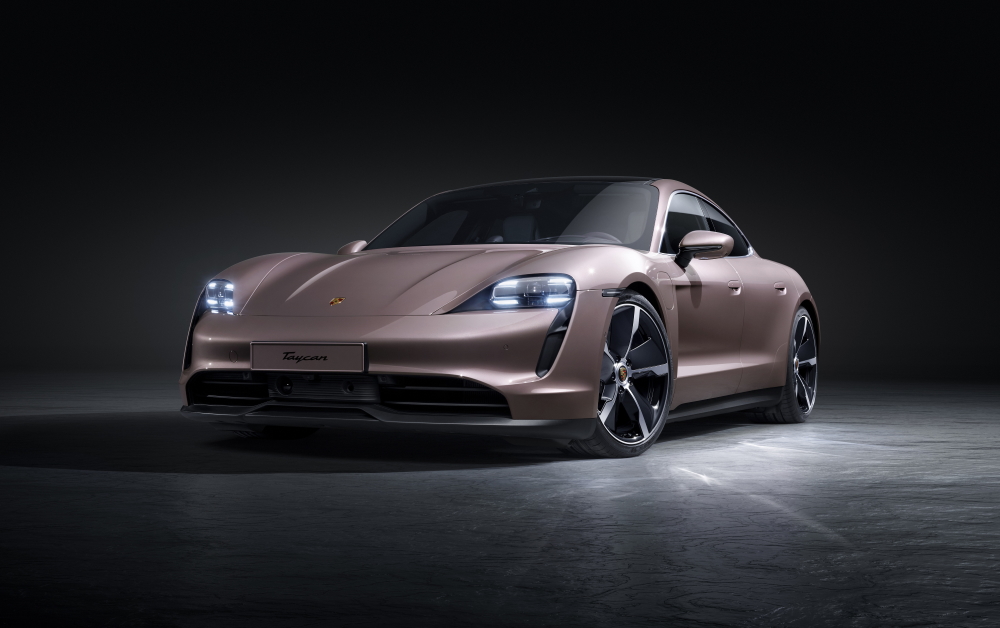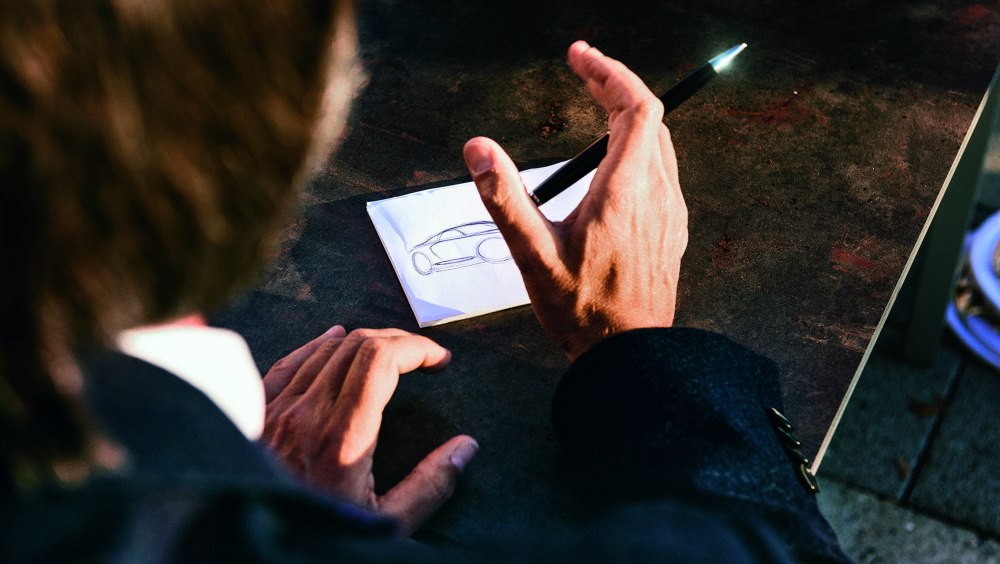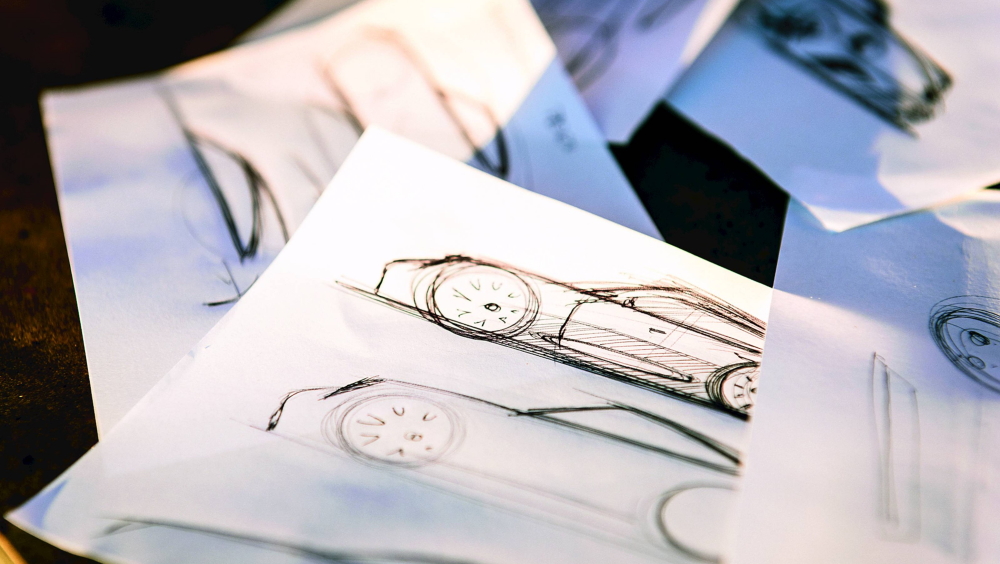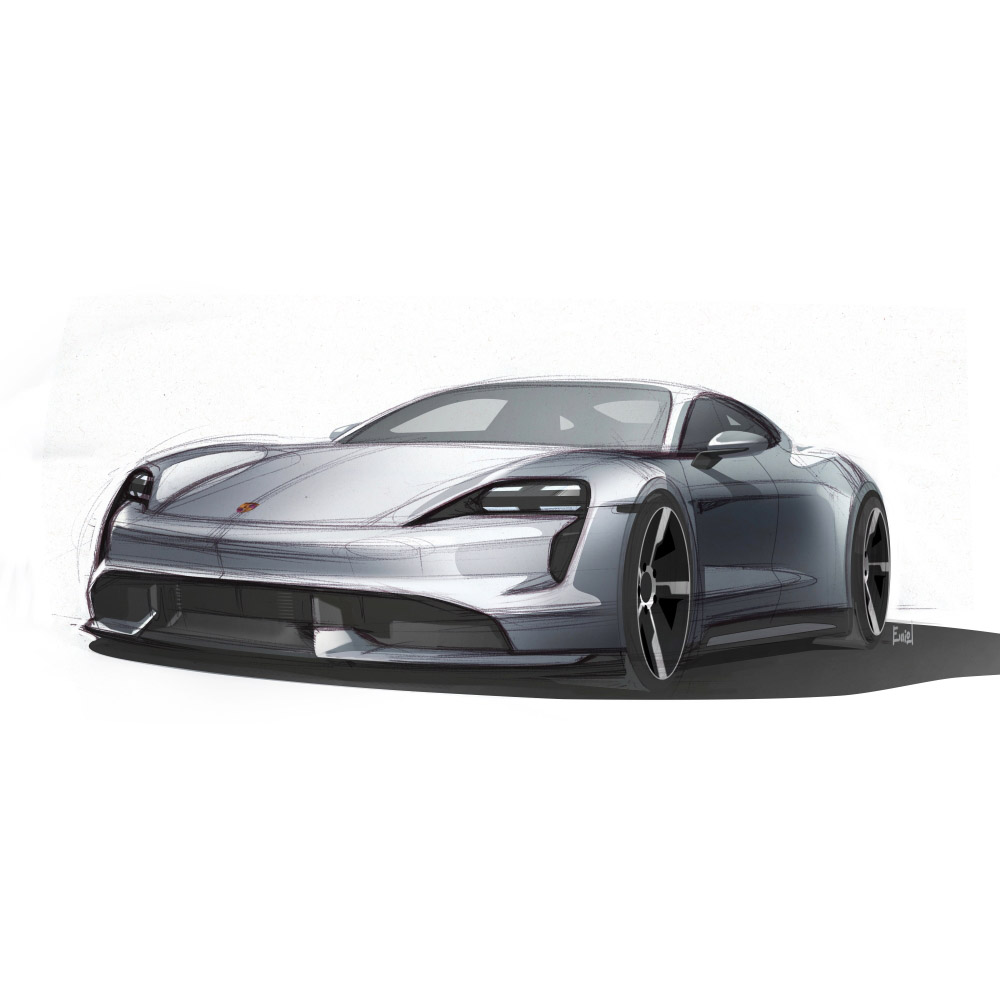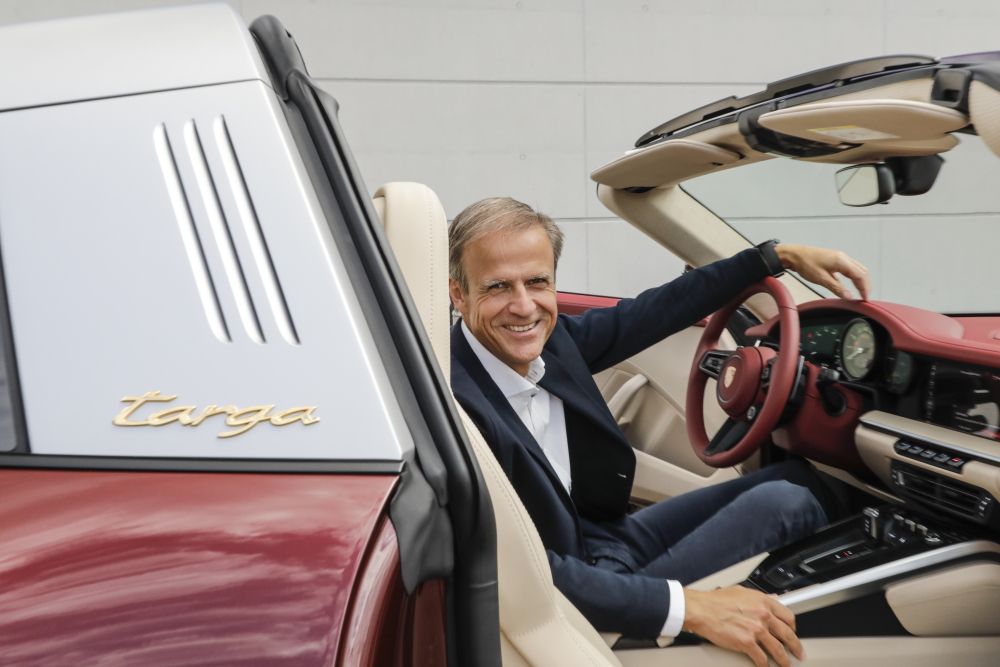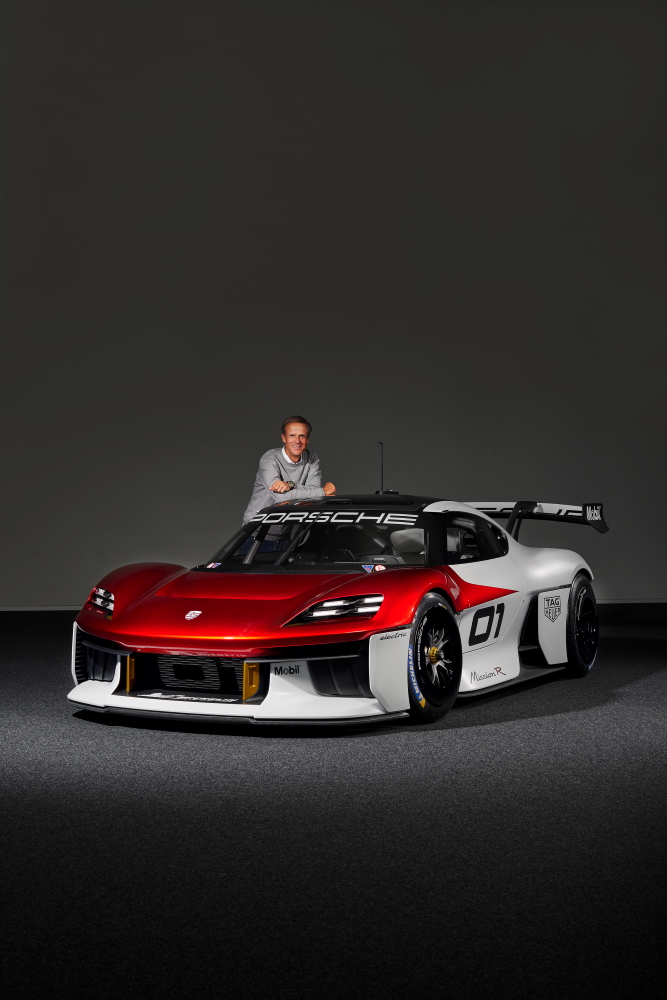Michael Mauer
Porsche's & VW's head of design / car designer
Germany
Porsche 911. Porsche Taycan. Panamera, the first sports sedan in the history of the sports car manufacturer. Mission E Cross Turismo. Cayenne. 918 Spyder or the 960. Vision Gran Turismo. These names make car lovers' eyes light up and their hearts beat faster. Before the sport cars in question and numerous other models of this world-renowned manufacturer could roll off the production line, they or at least their bodywork redesign were always only a vision of Michael Mauer, Porsche's head of design/director style, and his team.
Michael Mauer
Porsche's & VW's head of design / car designer
Germany
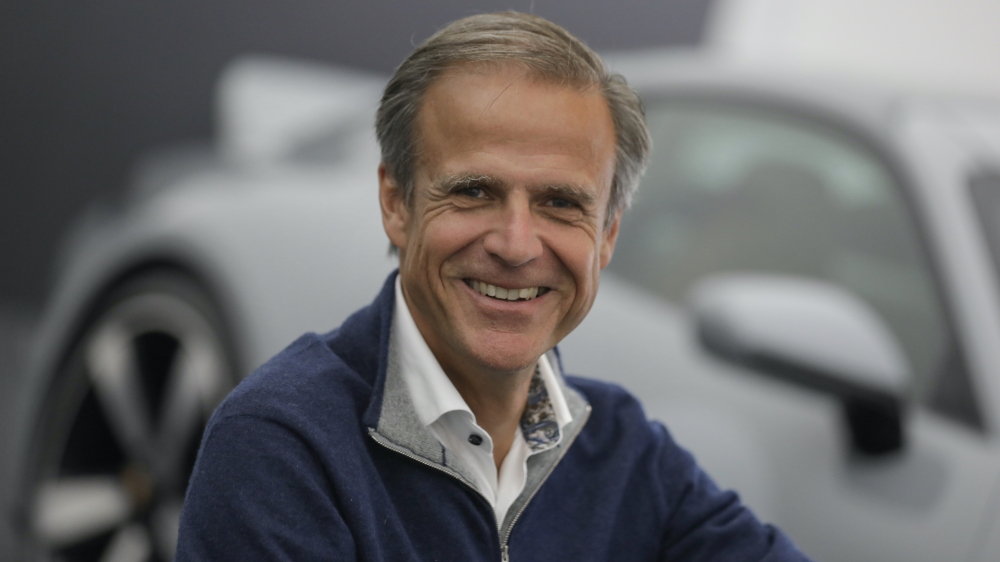
„Future is just a word“, he says in Porsche‘s promotion video episode 17. „It is the description of a period of time that lies ahead of us. Nothing is fixed there yet. It's a way of shaping that space." At Porsche's own development centre, there is the opportunity to create a car from the initial idea and first sketch to a finished prototype for a drive on its own test track. "The in-house studies for the future never have a concrete starting point or brief, but emerge from discussions about, for example, "How far can a Porsche design language be stretched?".“ Decisive for Mr. Mauer are not only the design and surface quality but also the search for the perfect line. The real impetus of his work, however, lies in the following perspective: "Only if I deal with a period of time that lies very far in the future and do so without the restrictions I have in the present and now, I am able to develop ideas that change my view of today or of the immediate tomorrow. I am deeply convinced that I then generate answers to questions that no one is asking today. In this way, I believe, a company is faster and has the fresher ideas. Being concerned with the future is the key to being successful in the long run!"
This visionary is known for pushing the boundaries of what is possible. But prior doing so Michael Mauer (* 28 July 1962, Rotenburg an der Fulda) studied transportation design at Pforzheim School of Design from 1982 onwards. „In 1995, as one of three divisional heads, he was jointly responsible for the design of the Mercedes-Benz SLK, SL and A-Class models. In 1998, he took over the management of the Mercedes Benz Advanced Design Studio in Japan. In 1999 he became chief designer at MCC Smart. In 2000, he moved to Saab as Executive Director Design and was responsible for the Saab 9X and Saab 9-3 studies. Since 2004, Michael Mauer has been head of the design department at Porsche AG. From mid-December 2015-2022, Mauer was additionally entrusted with the management of the Volkswagen AG Group Design Division“ (Wikipedia, Germany) - a job he has taken on again in addition to his existing one since 2023.
At the end of February 2026, Michael Mauer left Porsche because a new Head of Design was appointed. "Michael Mauer shaped an era at Porsche", said Dr. Michael Leiters, Chairman of the Executive Board of Porsche AG. "Together with his team, he has carefully brought the iconic design of the 911 into the modern era and at the same time unmistakably transferred the Porsche design DNA to new model series."
Interview April 2022
Giving shape to the future: searching for the perfect line
INTUITION/IMAGINATION
How does intuition present itself – being a gut feeling or a suspicious impression?
Often as a suspicious gut feeling.
Will any ideas be written down immediately and archived?
Of course not! Only ideas that go hand in hand with a good gut feeling.
What if there is a deadline, but no intuition? Does the first fuel the latter maybe?
A certain time or budgetary pressure makes the subconscious work more intensively on the solution ... which then expresses itself in a tangible, experienceable intuition.
Are great ideas based on intuition and - as a possible follow-up - do they reveal themselves in a kind of clear as well complete version that just to be realized? Or is it endless trials and errors that result in constant developments up until the final result?
The famous napkin sketch exists, but it is totally overrated ... good ideas are mostly based on "getting busy and dealing with it".
World-famous guitarist Carlos Santana said to me, when the “sky” opens and sends you a brainwave one has to grab that special spiritual moment for realising it before the clouds darken all again. What do you think about that?
The flash of inspiration is the only flash that is not destructive. However, not every flash of inspiration is worth pursuing.
Does every idea exist immaterially already and just has to be put into effect, i.e. is creativity in its profound purpose basically about transferring dreams into reality?
Every idea already exists. It just needs to be discovered and put into the right context. The implementation of an idea is the far more difficult part.
INSPIRATION
What inspires you and how do you stimulate this special form of imaginativeness?
White walls ... a ski tour or an intense discussion among colleagues ... inspiration is everywhere!
Do calm and relaxation prove the most suitable or does pressure fire up creativity?
The moments when I give my subconscious a time-out are the birth hours/origin of my creativity.
How do you separate the good from the bad and which ideas are worthwhile to be explored further or whether one idea has the potential of being outstanding really?
Any idea could be the best. Working after the flash of inspiration has hit shows the potential of the idea.
What key criteria does an idea need to be viable i.e. does it have to appeal to you personally or promise commercial potential/fulfil certain needs?
In the beginning it is the good feeling, from which a firm conviction can grow...Which then also has to be defended and argued according to the motto "I am convinced and don't let facts confuse me"....
Does inspiration show itself for you in a kind of clear and complete vision, so that you only have to capture the imagination in a way that corresponds to your creativity?
As a creative person you have more sensitive antennae for new things, which is the basis for creativity.
Do you sometimes revisit old(er) ideas (especially in tough times of need)?
It is always very worthwhile to revisit older ideas from time to time. New timing makes an old idea appear in a new light.
Do you check what colleagues/competitors are up to/your role models contrive(d)?
Keeping your eyes open ALWAYS inspires!
CREATIVITY
Which time/place/environment suits your creative work process the best?
The most valuable creativity comes from alternating between developing ideas alone and in a team.
Which path do you take from theory/idea to creation i.e. how do you start?
With a classic brainstorming session or, as I like to call it: an idea ping pong.
How important are self-doubt and criticism (by others) during such a process?
Self-doubt and criticism are an essential component in turning ideas into great ideas.
Is it better to be creative on your own, only trust your own instincts, or in a team?
At the end of the day, ideas that are created in a team or at least developed further in a team.
What is your personal approach/motivation/concern regarding creative activity?
Concern. There are people who believe that because of new technologies, a creative process can be shortened almost infinitely.
If you'd make a pie-chart: what is your satisfaction based upon - a) self-realisation/ personal compliance, b) artistic recognition or c) commercial success & fame?
The fulfilment of having brought the tender seedling of an idea into the world through all odds is a great fulfilment. If commercial success is added to that ... so much the better.
Is craftmanship important or should creatives be able to work 100% unloaded?
Nobody works 100% unencumbered. Everyone is subjected to outside influences. The art is to be aware of this, to use what is helpful, to weed out what is pointless.
Can routine, experience and professionalism make up for lack of creativity?
Routine and experience at least lead to a certain serenity ... and that leads to the necessary calmness to develop an idea further in a meaningful way.
If problems occur during the creativity or one’s stuck, how can that be solved?
With calmness and persistence.
Are a never give up attitude and persistently hanging on necessities for creatives?
Yes.
What is better in the realization process: speed and – if that’s possible - force creativity i.e. grasp the magic of the moment, or a slow, ripening process when it comes to implementation and elaboration?
Depends on the project! Experience helps to decide when it is the right time to stop.
„Creativity is the ability to reorganise known factors so that they become novel and fresh.“ Do you agree with British rock-manager Tony Stratton-Smith?
There are different types of creativity. Disruptive creativity, evolutionary creativity or just reorganising creativity, which is the image of bricolage.
Should a creative always remain true to him-/herself including taking risks & going against the flow or must one, for reasons of (commercial) survival, make concessions to the demands of the market, the wishes of clients and the audience’s expectations?
Never too far, but always far enough.
How is innovation still possible if one has established a distinctive style?
Distinctive style and innovation are not contradictory!
Is it good to be ahead of one’s time even one hazards not being understood at all?
See answer before last ... following the Maya principle.
When does the time come to end the creative process, to be content and set the final result free - or is it work-in-progress with an endless possibility of improvement?
It takes some experience to understand when the time has come to stop. Otherwise you run the risk of "making things worse".
In case of failure or - worse - a creativity crisis how do you get out of such a hole?
With the firm belief that it's only a matter of time until the solution shows itself... or drink a few glasses of red wine.
Did you ever deliver something that you considered mediocre, but was successful?
Mediocre things are never really, or sustainably successful!
SUCCESS
Why are some people successful and others not - despite the same talents?
Talent can only ever be the starting point for success, the rest is persistence, perseverance, discipline and luck!
Should/can one resist the temptation to recycle a 'formula' one’s successful with?
Knowing that only constant change, constant reinvention, leads to success, one should be able to resist the temptation.
Is it desirable to create the ultimate/timeless work but doesn't “top of the ladder” bring up the question of “what’s next?” i.e. isn't such a personal peak “the end”?
The better is the enemy of the good. If you approach a project with the aspiration to do something better and don't change things just for the sake of change, the new will always be better than the old. And the new will then be both ultimate and timeless.
MY FAVORITE WORK
Porsche Taycan.
A Porsche that clearly carries the Porsche brand identity and at the same time clearly and very clearly stands for the future viability of the brand.
